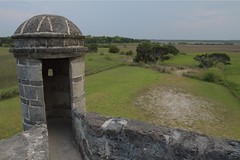
The flatboat drags itself back and forth across the muddy channel south of St. Augustine, FL. Gray skies frown in the distance as an eerie robotic voice on the weather radio chants about hail in Georgia. Between the weather, the late hour, and the obscurity of Fort Matanzas National Monument, relatively few tourists are on the boat. And this is probably as it should be. The old Spanish fortress in St. Augustine is breathtaking, its hulking masonry and exotic turrets looking like a piece of medieval Europe that was accidentally carried to Florida by a freak hurricane. There is nothing else in the United States like it—the Spanish presidios in the Southwest were ephemeral piles of kindling in comparison, while English and American fortifications have a distinctly New World quality and lack the romance of Spanish architecture. The fort at St. Augustine is a place worth visiting.
Matanzas is another story. Indeed, it is the sort of historical ruin that forces one to reconsider the act of preservation at all. Where St. Augustine is both architecturally and historically significant, Matanzas is a small, graceless, two-room box erected to stop boats from reaching St. Augustine along a an interior waterway, a purpose it fulfilled without ever firing a shot. For most of its 90 year tenure, it housed eight underfed Spanish conscripts who slept in one, large common bed and spent the bulk of their time fighting disease rather then enemies. Not surprisingly, it was abandoned in the 18th century. It crumbled over the ensuing years, only to be reconstructed by the federal government and connected to a parking lot by the dumpy flatboat.
The ranger who recites this information does it in a cracking, prepubescent voice. Though the fort's sole purpose today may be to keep him employed, he seems disgusted with it, as if telling the story of its irrelevance is a referendum on the value of his own life. His disgust is not visible to the family of six sitting on the right side of the boat, where a father is thrilling his children and exasperating his wife by making his voice sound like he has suffered a tracheotomy. "Can I borrow a dollar for a donation?" he buzzes to the giggles of his children. "Only if you stop speaking in that stupid voice," his wife responds. "Okay," he buzzes back at her. She frowns. The ranger squeaks on, the wife ponders divorce, and the robot on the shortwave crackles with rumors of distant hail.
On the freeway to Savannah, the last drops of pink have bled from the atmosphere, leaving the sky ash gray. The freeway is lined with the black silhouettes of pine trees, its median cluttered with vegetation. Black and gray. The lone semi is black and gray, too, its small red tail-lights the only points of color for miles. It is fast moving, rolling squarely down the center of a three-lane road. The truck is completely unmarked, its white and blue license plate stating "Permanent" instead of listing a state of origin. On the rear bumper there are two arrows pointing off to each side of the truck. The left side reads "LIFE" and the right "AFTERLIFE."


